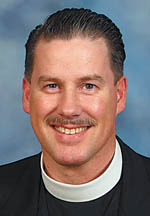
By Father Scott Lemaster
“I AM He, the one speaking to you…”
On the third Sunday of Lent, we move from the Gospel of St. Matthew, where we meditated upon the meaning of Our Lord’s Transfiguration, to the Gospel of St. John. In this passage of St. John, we meet a poor woman who is thirsty but doesn’t quite know about her thirst. But, we must not get ahead of ourselves.
The Lord and the Apostles are on their way to Galilee, and the usual route for a pious Jew was to go through the land of Perea in order to avoid the land of the Samaritans; both peoples, the Jews and the Samaritans, hated each other. But Jesus chooses to take the direct route … which, of course, the Apostles do not understand.
Isn’t this usually the case? We choose one direction in our life, about which we are certain (or so we think) but the Lord has a different plan. The legendary hatred between the Jews and the Samaritans dates back to the year 722 B.C. when Samaria became a conquered people and were forced to marry non-Jewish people and to worship on a mount that is not Jerusalem.
“Jesus, tired from His journey, sat down there at the well. It was about noon.” (St. John 4. 6) He is thirsty, and, astonishingly, asks a woman there at the well to give him something to drink. I say astonishingly because the woman is a Samaritan and she is a woman — in that time, no man could make requests of a woman he did not know. Also, according to the customs of the day, it is odd for a woman to be drawing water at that time of day — about noon — the normal time to draw water was early morning or at dusk. Only an outcast would be at the well at that time of day. But Jesus came for the outcast, did he not?
“Jesus said to her, ‘Give Me a drink.’” (St. John 4. 7) Notice that the Lord’s request is answered with impatience by the woman, or so it seems. We find out, however, that her impatience comes from a heart that is thirsty, because it seems to have been broken. On being told by Jesus that he has water to give that will “well up to give eternal life,” she asks for this water so that she will “no longer be thirsty or have to keep coming here to draw water.” (St. John 4. 15) One wonders if she often felt loneliness and disgrace coming to the well alone …?
“Go call your husband and come back.” (St. John 4. 16) It seems the reason for the woman’s public disgrace is that she has had many husbands — “five, and the one you have now is not your husband.” (St. John 4. 18) We know nothing from the sacred text why the woman has attempted so many marriages. We only know that she is searching, and, most importantly, she is listening to the Lord and trying to “minister to Him in His needs.” (cf. St. Matthew 25. 44)
At this point the woman dodges, trying to divert the Lord with questions about religion and proper worship — but Jesus will not be deterred. While not accepting her sinful behavior (Jesus’ attitude toward sin is firm and unmoving) yet the heart of Jesus looks beyond the sin to embrace the sinful woman. Their dialogue reveals everything.
The woman exclaims: “‘I know that the Messiah is coming; the one called the Christ; when He comes, He will tell us everything.’ Jesus said to her, ‘I AM He, the one speaking with you.’” (St. John 4. 25)
Amazingly, the woman’s encounter with the Lord is one that changes her completely. Leaving the solitude of the well, she goes into the village to announce the Lord: “Come see a man who told me everything I have done. Could he possibly be the Christ?” (St. John 4. 28) At this point, because we must keep our words to a minimum, it might be a good idea to remember that, at the foot of the cross, there stood only one man, the young St. John. All of the rest of Jesus’ followers during those bitter hours were women.
It would not be amazing, in those three bitter hours at the foot of the cross, if those devoted women, seeing the agonizing death of Jesus, thought the same thought of the woman at the well: Could He possibly be the Christ? Yet, like the Lord Jesus, they were “faithful to the end.” (cf. St. John 13. 1) In our darkest moments — and in our joys — we ask for the grace of the faithful women, especially of that one most faithful woman, Our Lady: for the grace of perseverance and faith, to stand gazing at the pierced side of the Lord, knowing that in our thirst, we shall be given his blood and water gushing unto eternal life. (cf. Pope Benedict XVI, Deus Caritas Est, cap. 12; St. John 19. 34)
(Fr. Lemaster is pastor of Assumption & St. Patrick Parish, Charlotte; St. Patrick Parish, Delmar; Immaculate Conception Parish, Petersville; and Ss. Mary & Joseph Parish, Sugar Creek.)







